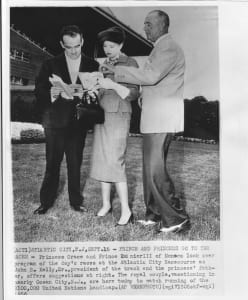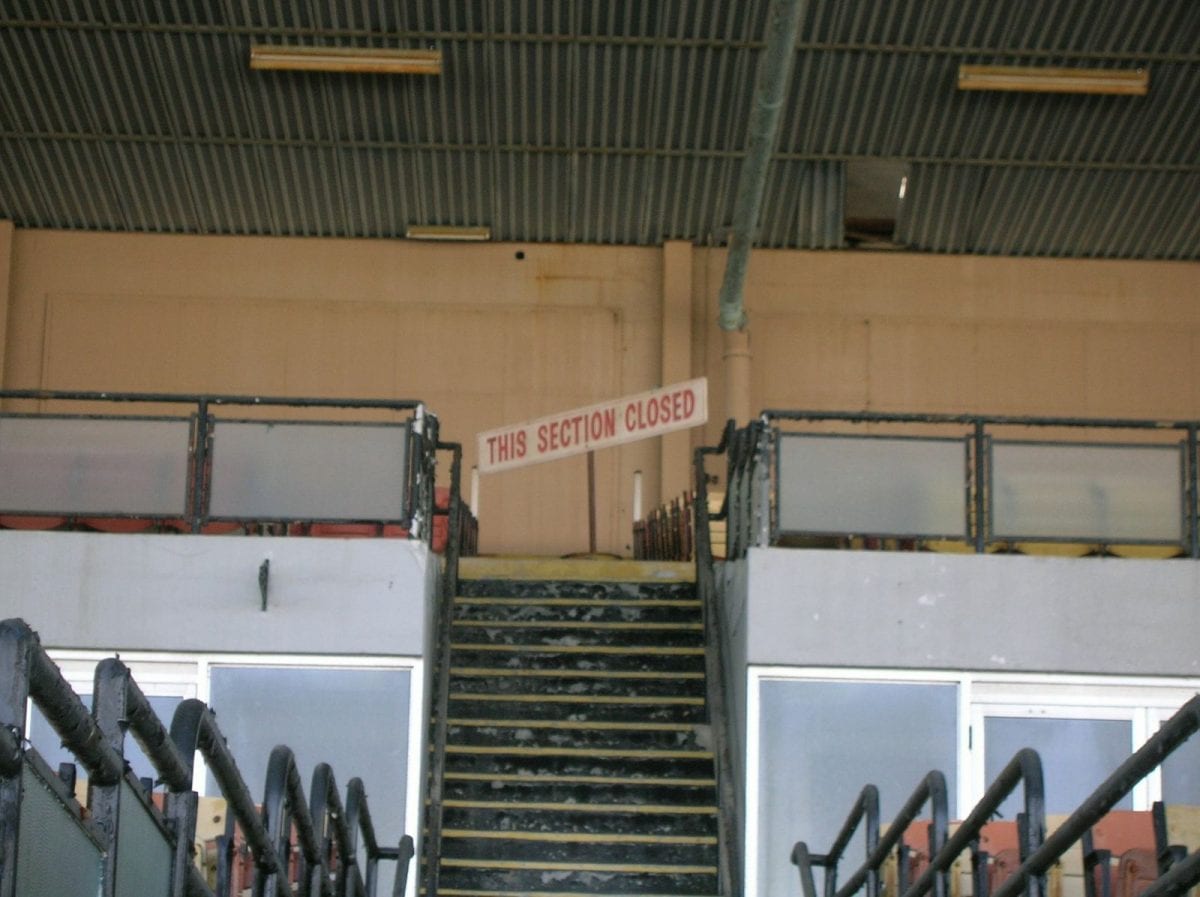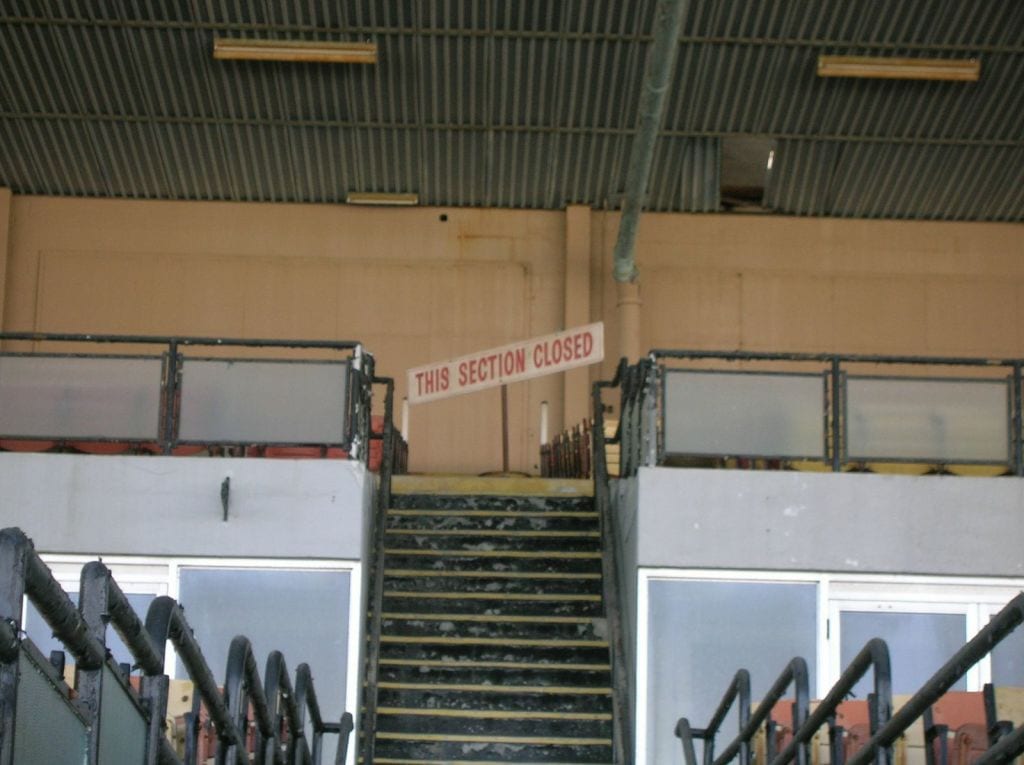by Linda Dougherty
On July 26, 1946, a horse racing track nestled in the pines of southern New Jersey threw open its gates. Soon, the brainchild of four men, including Olympic gold medalist (and father of the future Princess Grace of Monaco) John B. Kelly, Sr. and Philadelphia broadcasting pioneer Leon Levy, became the playground for large and enthusiastic crowds that included the rich and the famous.
Nearly 70 years later, on January 16, 2015, Atlantic City Race Course – where Bob Hope, Frank Sinatra and Princess Grace of Monaco cheered and wagered on their favorite thoroughbreds – closed forever, a battered shell of its former self.
Joe Wilson, president of owner Greenwood ACRA, stated in a press release that: “We regret to announce that we must close Atlantic City Race Course immediately due to continuous business decline in the industry, the current regional economic climate and the absence of alternative revenue opportunities.”
Wilson could not be reached for comment for this article, but in a published report said that the racetrack had lost at least 60 percent of its business over the last eight years.
Yet it’s possible that even this may not be the end of the story. Does the track — known equally for its innovation and for its resilience — have yet another act?
The McKee City oval, once famous for having “A Smile and an Eighth” as its advertising slogan, was a trendsetter on the national stage, having become the first track to conduct a full season of night racing in 1976, and then the first to take simulcast wagering in 1983. It was host to many of thoroughbred racing’s great competitors in stakes events like the United Nations Handicap and the Matchmaker Stakes.
But, like all New Jersey racetracks, it operated without the added benefit of expanded gaming revenues, which tracks in neighboring mid-Atlantic states began to enjoy starting in the late 1990s.
Long before the Atlantic City casinos opened in 1978, the new track was seen as a threat to that popular Jersey Shore tourist destination. In December, 1949, attorney Marvin D. Perskie wrote to the state Racing Commission requesting it not approve the 1950 July-to-September meet as the “track is hurting Atlantic City business.” Yet the track attracted sizable crowds and enjoyed steady handle until the advent of the casinos.
Racetracks in New Jersey lost significant attendance and handle when the casinos opened, and once Pennsylvania and Delaware started attracting better horses and trainers thanks to higher purses from slot machine revenue about 2007, the entire industry was in deep trouble.
By that time, ownership of Atlantic City had passed, in 2001, from Robert P. Levy, son of the founder, to Greenwood Racing, Inc., owner of Parx Racing and casino and its six off-track Turf Clubs, for $15 million. Greenwood applied for only the minimum amount of dates to be able to offer simulcast wagering in New Jersey, and the once-glamorous track fell into disrepair.
The New Jersey state Senate approved legislation in 2008 to give racetracks a $90 million subsidy from Atlantic City casinos over three years for not pursuing the installation of video lottery terminals (a form of slot machines) at their properties, but the subsidy was eliminated in 2011, as Gov. Chris Christie redirected it toward Atlantic City’s marketing efforts as part of a five-year revitalization plan (which now appears to be a failure).

In this vintage AP Wirephoto, Princess Grace and Prince Rainier visit Atlantic City Race Course. Photo provided by Linda Dougherty.
Greenwood presented brief six-day, all-turf meets in April and May at Atlantic City, and during the last few years the live product enjoyed an improving business, with daily average handle reaching more than $800,000. Trainers in the region used the opportunity to tune up their horses and get them ready for summer and fall turf racing.
Yet, though the facility, which sits just off the Black Horse Pike, is now closed, that may not be the end of the story.
Darby Development, operator of Monmouth Park, has expressed an interest in buying or leasing the track from Greenwood. Dennis Drazin, Darby’s advisor, said he could not comment publicly on the particulars, as he was waiting on a response from Wilson.
“I can say we would not be interested in operating just a training center,” said Drazin. “We would be interested in preserving live racing in south Jersey.”
Although it could be said that the handwriting was on the wall for Atlantic City for many years – with “final goodbyes” having been said in 1998 and again in 2002 – horsemen reacted with surprise at the announcement that it was closing for good.
“I was shocked,” said trainer Ron Glorioso, 73, who shipped horses there each year and has many fond memories of attending the races as a young man. “I used to love going to Atlantic City; it had the best grass course and was so picturesque. In the 1950’s, the crowds were so big you couldn’t park in the lots, you had to park out on the road. Even in recent years, they never promoted it and still they got big crowds.”
Glorioso, the first trainer to move into Keystone Racetrack (now Parx) in 1974, said he believes the Atlantic City property is “a sleeping giant.”
“You could rehab about 10 barns and rent out the stalls, because there’s always a need for extra stall space in this area,” he said. “You could take the existing grandstand down and put up a smaller one, run a spring and fall meet of 20 days each, and have an OTB there in the off-season. It could still make money.”
SOURCES
In addition to interviewing the individuals quoted above, the author used the following sources:
- Atlantic City Race Course Timeline, The Press of Atlantic City, January 9, 2015
- Tides have turned for Atlantic City Race Course, Mid-Atlantic Thoroughbred, September/October 1995.
- Thoroughbred Racing Associations 2014 Directory and Record Book. “Atlantic City Race Course,” p. 17. Published by the TRA, Elkton, Md.










Sorry, but the whole area, not just the racetrack is in decline. Wilmington, Camden and Trenton were nice places to live when the track was in it’s prime, no more. While racing enthusiasts blame slots, slots enthusiasts are looking for someone to blame too. Delaware’s finding out slots are struggling to exist, much less subsidize anything else. Keep us informed Linda, I appreciated the article.
“You could take the existing grandstand down and put up a smaller one,
The cost of tearing down the grandstand alone is next to prohibitive. The place is quadruple layered with asbestos. Sadly enough, racing is all but dead in NJ.
Agreed – you can’t move asbestos in New Jersey like they showed on the Sopranos.
Just to be clear, even in its best days, AC was never the equal of Garden State and Monmouth.
What happened to racing in Atlantic City and many other racing venues was the lack of promotion by local industry leadership. Too many thought slot revenue was the medicine that would return horse racing to it’s golden era when it had little competition. Sadly, the industry continues in decline mainly because it has failed miserably to change & evolve to a gambling environment that offers easy access & a wide variety of gaming choices to the consumer. Thoroughbred racing is desperate for leadership; everything flows from good leadership.
Jerry Townsend
HOST – Talk’n Horses With Jerry “t”
Cumulus Radio – WXSM 640am (Bristol, VA)
Just a slight correction – the first year of casino gambling in A.C. was 1978- not 1976.
Thanks for the catch. Gambling was passed in ’76, with the first casino opening in ’78.
Got to visit the A.C. course last season for the first time, you could see glimpses of the past but in truth it`s time to let the old girl go ( unfortunately).